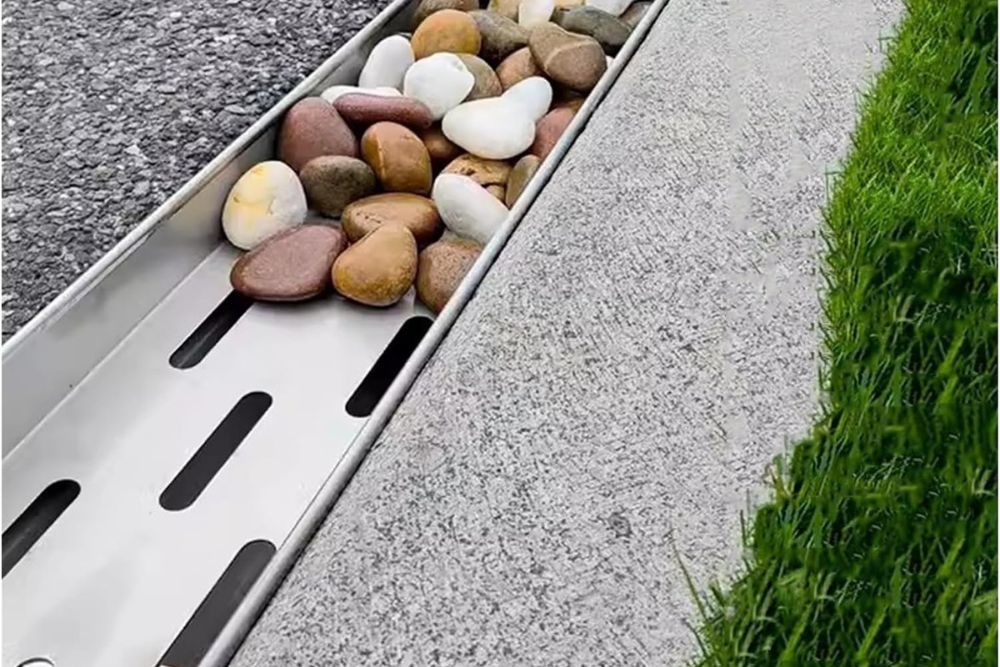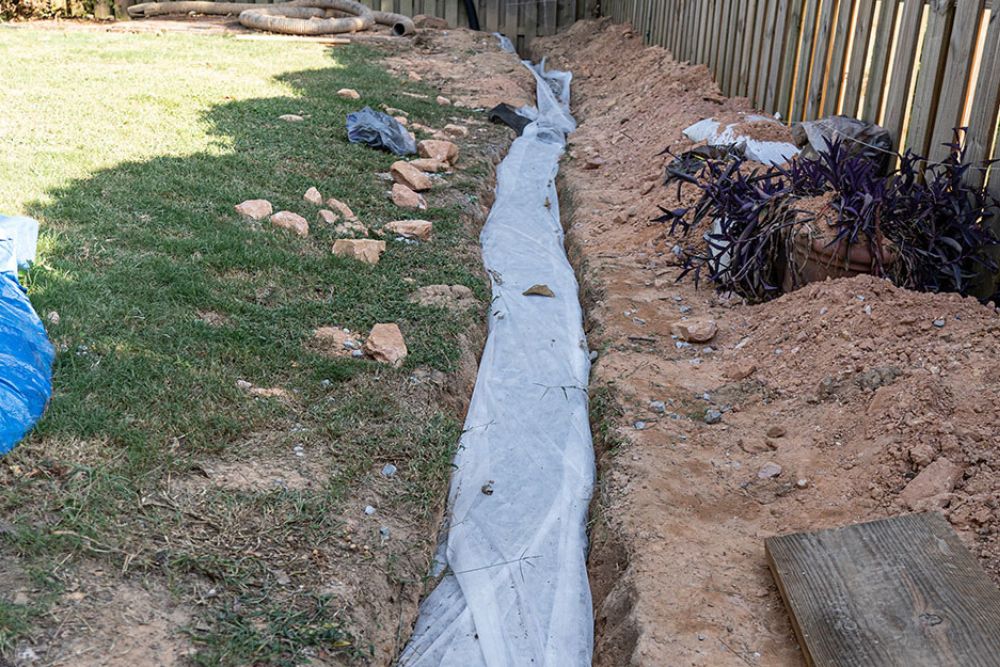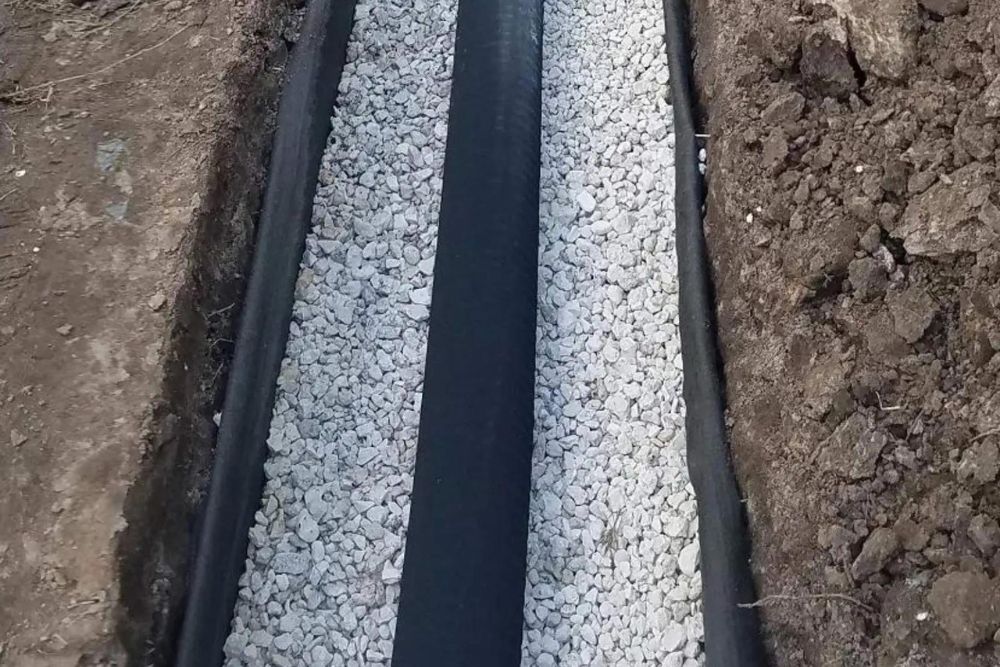

We may earn revenue from the products available on this page and participate in affiliate programs. Learn More ›
What You Need to Know
- A French drain system can be an effective long-term solution to water drainage problems both inside and outside the home.
- French drain installation specialists, landscapers, foundation repair technicians, basement waterproofers, and plumbers can complete this job.
- Depending on the project, French drain installation can cost anywhere from $500 to $18,000.
- Unless homeowners have extensive experience with drainage systems, it’s generally best to leave French drain installation to a professional rather than attempting to DIY.
Q: I’ve recently had some water issues on my property and I’m considering installing a French drain system. Who is the best professional to call about this, and what is the average cost to install a French drain?
A: For homeowners with frequent water issues such as minor flooding in the yard or water seeping through the basement floor, a French drain system can be a worthwhile investment. This system, which involves digging trenches to collect excess water and divert it away from the home, can be installed both indoors and outdoors. The right professional for the job depends on a few specifics about the project. French drain installation companies specialize in creating drainage solutions throughout a property. Landscapers commonly install French drains to solve water problems in the yard. A basement waterproofing company or one of the best foundation repair companies (such as Basement Systems or Olshan) can tackle drainage problems around the home’s perimeter. Finally, some of the best plumbing services (such as Mr. Rooter and Roto-Rooter) also put in French drains.
Homeowners will want to explore the different types of home improvement professionals who can handle the installation of a French drain, as well as what kind of budget this project might require. These insights can be used to make informed decisions for the property’s water management needs.

A wide variety of professionals offer French drain installation. Some companies exclusively specialize in this project.
French drain installation is a service offered by a diverse range of professionals from landscapers to plumbers to foundation specialists. These professionals bring a varied skill set to the project, often integrating the drainage system seamlessly with other landscaping or construction work.
Having an array of service providers to choose from helps homeowners identify the right expert for their specific needs, be it a complete landscape redesign or a targeted solution to address water accumulation issues. However, there are also benefits to hiring a company that specializes only in drainage solutions. Jason Crowe is the owner and founder of NC Drainage, a drainage system installation and maintenance company based in Graham, North Carolina. Crowe emphasizes that drainage professionals have seen it all and can apply their experience to many different kinds of properties. “When I’m going to a property I’m looking at it from a holistic point of view. I’m not just looking at the structure, I am looking at the yard, the landscape, the driveway, the sidewalks, I’m looking at the entire property as a whole. Drainage is a tricky thing in that there can be multiple solutions to try to solve each independent problem.”
He also emphasizes that French drain installers have an in-depth understanding of soil conditions, which is crucial to the success of this project: “Soil is so important so a company that does drainage all the time knows the local soil conditions that it works in…one solution that might work in one city might not be the best solution in the next town over because of the soil makeup.”
If the primary concern is groundwater pooling in the yard, a landscaper may be the best professional to hire to install a French drain.
For those wondering who to call for drainage issues in the yard, landscapers are a great option. Crowe confirms, “If it’s a simple stormwater problem where you have let’s say a pooling area in your driveway or a low spot in your yard, I’d be comfortable with a landscaper putting in a catch basin or adding fill dirt to shape out or regrading, those are things that landscapers are capable of doing.” Landscapers have a comprehensive understanding of ground topography, soil types, and landscape design. Their skill set enables them to install a French drain system properly and also integrate it seamlessly with the existing layout, ensuring that the end result is both functional and aesthetically pleasing.
The best landscaping companies can check the water flow patterns in the yard, identify the most effective locations for the drain, and choose materials that complement the landscaping. They can also address any related concerns, such as the impact on plants, lawns, and other landscape features. Most importantly, landscapers can assess whether a property needs an adjustment of the grading or elevation around the home to prevent water from infiltrating the foundation.

Foundation repair and basement waterproofing companies typically offer both interior and exterior French drain installation to protect homes from water damage.
French drains can be installed on the inside or outside of a property based on the specific water management needs. Exterior French drains are commonly used to prevent ground and surface water from affecting a home’s foundation, which involves installing a trench filled with gravel and a perforated pipe around the perimeter of the house.
On the other hand, interior French drains are installed around the inside perimeter of a basement. This approach is used to address water that has already entered, channeling it away from the basement (typically in conjunction with a sump pump) to prevent damage and flooding. While interior drains can occasionally be useful for severe water infiltration, according to Crowe, it’s often worth trying exterior solutions first. “It’s also much easier and much less expensive to keep the water from getting there in the first place…I can think of many cases where somebody is about to spend $20,000 on crawl space encapsulation to keep moisture out…[but] they have 3 downspouts that are pumping right into their foundation. For a couple of thousand dollars, you can bury these downspouts and your problem probably goes away.”
In situations where water is leaking into the basement after heavy rain, one of the best basement waterproofing companies (such as Basement Systems or B-Dry) will be well-equipped to install both interior and exterior French drains. It’s worth noting that since basements and foundations are closely linked, there is often overlap in the kind of projects both foundation and basement waterproofing companies offer. Companies specializing in foundation and basement waterproofing have the expertise to assess a home’s unique situation and recommend the appropriate type of French drain installation.
Lastly, plumbers may also be qualified to complete this project.
Although plumbers are usually associated with the maintenance and repair of interior plumbing systems, they may also be qualified to install French drain systems. Their expertise in handling water flow and drainage makes them skilled at addressing excess water around a property.
Plumbers understand the dynamics of water pressure and movement, which are critical factors in the design and installation of a French drain system. They can assess the specific needs of a property, considering soil composition, existing plumbing infrastructure, and the overall drainage requirements. Additionally, their experience with various types of piping and drainage solutions allows them to select the most appropriate materials and techniques for the project.

The typical cost to install a French drain is between $500 and $18,000.
The average French drain cost can vary widely depending on several factors, including the type of drain, its complexity, and the extent of work required. There are four primary types of French drains:
- Curtain drains. These French drains are shallow trenches dug across a slope to intercept water running down the hill. They can vary in cost based on the size of the area and the terrain.
- Exterior French drains. This type of underground drainage system involves digging a trench around the exterior of a home and laying a French drain pipe to divert water away from the foundation. The cost here will depend on the amount of excavation and landscaping restoration required.
- Interior French drains. Professionals will install this type of French drain in the basement of a home to redirect water. If extensive interior work is necessary for installation, such as breaking through concrete, the price of interior French drainage systems will increase.
- Yard trench drains. Designed to address surface water collection, French drains for yards can vary in cost depending on the length of the trench and the landscape’s complexity.
French drain costs vary based on type, with interior drains being the most costly and curtain drains having the lowest cost.
| Type of French drain | Cost Range per Linear Foot |
| Curtain drain | $10 to $25 |
| Exterior French drain | $10 to $50 |
| Interior French drain | $40 to $100 |
| Yard trench drain | $30 to $90 |
The final price for any of these installations will depend on the type of soil, the terrain of the property, the materials used, and labor costs in the area. Sometimes additional features are needed that can add to the project cost. For example, a sump pump costs between $1,200 and $2,500 and is often installed with interior French drains. Homeowners will want to get detailed quotes from local professionals to understand the costs for their specific situation.

Unless a homeowner has experience with this kind of project, it’s not recommended that they attempt to install a French drain themselves.
Installing a French drain is a complex project that requires professional expertise, and it is generally recommended that those without relevant experience do not attempt it themselves. Crowe adds, “I see at least once a week I see where a homeowner has started a French drain and they quickly realize that this is way more work than they would ever imagine.”
A DIY French drain installation involves a series of intricate steps that demand precision and understanding of drainage principles. The process starts with planning the route of the drain and determining the correct slope to ensure proper water flow. DIYers must then dig a trench that is around 18 inches deep, which can be challenging in hard or rocky soil. The trench must be lined with a suitable landscape fabric to prevent soil intrusion and then filled with gravel. A perforated pipe must then be laid carefully along the trench while maintaining the correct gradient. After the pipe is in place, the trench is filled with more gravel and then topped with soil or sod depending on the location. Crowe emphasizes that the dirt that is displaced from digging the trench must be removed rather than being reused to cover the drain: “What I see 90 percent of the time is homeowners don’t have a way to get rid of that dirt…so they end up putting it back over their French drain. So they basically end up with a French drain that they spent a whole lot of time and effort on and it doesn’t work.”
Mistakes in any of these steps can lead to an ineffective drain or even worsen the water problems, causing further damage to the home or yard. Considering these complexities, homeowners looking to install French drain systems will want to hire a professional who can guarantee a reliable and efficient drainage solution.
FAQs
French drain installation is no small project, so homeowners are bound to have questions before they commit to hiring a professional. Getting answers to a few relevant questions can help guide the decision-making process.
Q. How long do French drains last?
A French drain can last up to 40 years depending on the materials, the quality of installation, and the soil conditions. Regular French drain cleaning and maintenance, such as clearing debris from the grate, can extend its lifespan.
Q. Do French drains work in heavy rain?
Yes, French drains are designed to effectively prevent home water problems due to heavy rain by redirecting excess water away from structures. However, one potential disadvantage of French drains is that poor installation can make them prone to clogging with debris. While it isn’t possible to solve French drain clogs with one of the best drain cleaners used for sinks or showers, clogs can be cleared manually to get the drain functioning properly.
Q. What is the difference between a drain pipe and a French drain?
A drain pipe is a solid pipe used to transport water to a specific location, while a French drain is a trench filled with gravel and a perforated pipe designed to disperse water over a larger area. French drains prevent water accumulation by allowing water to seep into the ground along its length.
Q. Do you need concrete under a French drain?
It is not necessary to pour concrete under a French drain. Instead, drain trenches are lined with landscaping fabric and filled in with rocks to encourage proper drainage.
Sources: Angi, Lawn Love
